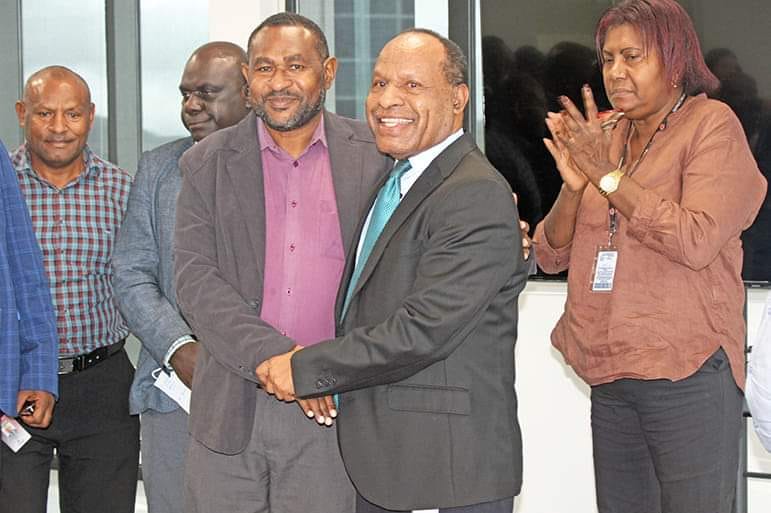A controversial government directive that will make politicians sole financial controllers of their districts has come under fire by bureaucrats.
The National Government’s Form 11 restructure requires all payments for goods and services at the district and provincial level to be approved and signed off by the Governor or district MP.
Thirteen of 22 provincial administrators, seven district administrators and five provincial finance managers who all wished not to be named, Tuesday shook their heads in disagreement, saying this is an unconstitutional move.
The controversial form 11 will effectively replace their section 32 powers, and their biggest fear is that political control will alienate proper controls and result in favoritism that will sway goods and services.
But the government Tuesday defended its move, saying that the public service in Papua New Guinea is undergoing a major restructuring because of increased level of funding to districts and provinces.
The changes, implemented by the Finance Department and issued under a financial directive, was allegedly undermining the 24 provincial departments and district administrators, including their secretaries in question because all financial powers they had, now transferred to Provincial Governors and the Open Members of Parliament.
The people we spoke to said that this was the first of a kind in any democracy in the world.
The paper also has sighted directive letters from Governors and confirmed from commercial banks that the Finance Department’s 01 December directive was communicated to them by political leaders.
“This instruction is issued to all Sub-National entities and requires all payments for service providers to be accompanied by Form 11, approved by the Governor or the Member of Parliament, as the chairperson for the District Development Authority (DDA),” the instruction from Finance Secretary Samuel Penias on 01 December 2023 stated.
Penias said with the shift in the focus of the National Government to sub-national level, there has been increased level of funding to the districts and provinces.
“These funds include the Services Improvement Programmes (SIP) funds, the Provincial Service Improvement Programme (PSIP) and the District Services Improvement Programme (DSIP) as well as the National Pandemic Funds – COVID-19, a Trust account managed in each district and provinces for COVID-19 related purposed payments.”
Under new instructions issued by the Department of Finance, all financial powers vested in the provincial secretaries are removed and given to the politicians, undermining the provincial departments and their heads, and the decision is not going down well with those affected in the latest changes.
The Finance Secretary issued a circular on all cheques from provincial governments.
The requirement breaches Section 32 of the Public Finance Management Act.
He also highlighted that the annual funding of District Support Grants and Provincial Support Grants and other additional direct funding that comes from either the national departments such as Police, CS, Department of Works, Department of National Planning and Monitoring and Statutory Authorities like National Fisheries Authority and the National Gaming Control Board.
A Southern region administrator said: “This is not right, we are allowing politicians to infiltrate into the administrative affairs of the provinces, very dangerous for the Constitution. There has to be separation of powers.”
Another provincial administrator from the Highlands region told the Post-Courier: “MPs are now project officers, for them to be part of the bureaucratic system, questions the Section 32 officers. They are trying to question how funding is to be made, especially budgeted activities, goods and services and its functions. We talk about good governance; this is not good governance.”
Another said: “The requirement breaches Section 32 of the Public Finance Management Act 1995 which gives powers to the provincial administrators to approve provincial government expenditure.
“It also breaches constitutional provisions which provides for separation of powers. The provincial administration is part of the executive arm of government (bureaucracy) and the Governor is a member of the legislative arm through Form 11.
“The Governors are definitely required to interfere into the business of the executive arm of government.”
One district administrator said: “Form 11 is a requirement to manage Service Improvement Programmes funds and is part of the acquittal process, why use this?
“In a situation where a provincial administrator is appointed by Cabinet and the Governor is an opposition MP and not happy with the NEC appointee, the province will face a nightmare in terms of service delivery,” one administrator said.
The Post-Courier was also in receipt of several Governor’s instruction letters to the administrators pertaining to the 01 December directive from the Department of Finance.
The Governor’s have also provided copies and notified commercial banks of the latter.
SOURCE: POST COURIER/PACNEWS














